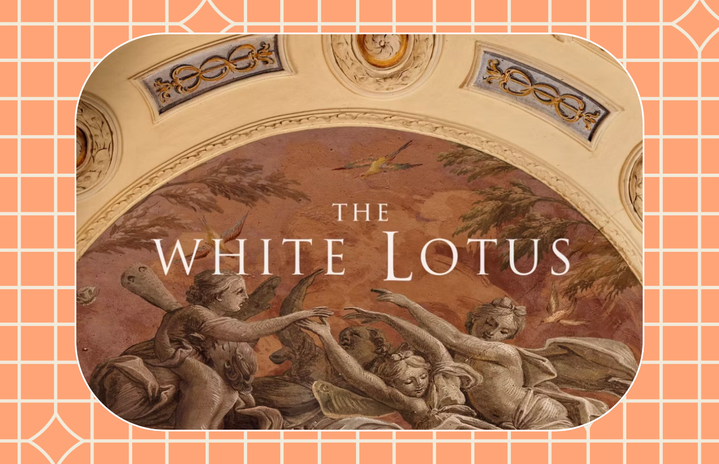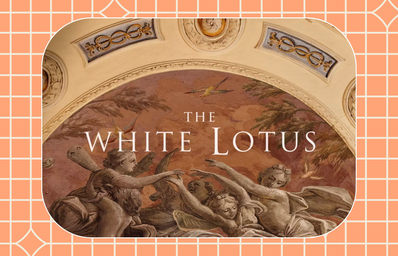[Editor’s Note: The following contains spoilers for The White Lotus Season 2]
After its first installation swept last year’s awards season, racking up 10 Emmys, HBO’s The White Lotus has made quite a splash with its second season— no pun intended. Mike White’s satirical comedy-drama follows the guests and workers at “White Lotus” resorts, with its second season taking place in Sicily. The ensemble cast gives outstanding performances, and the escalating suspense of the show is enough to keep viewers captivated— yet the magic of The White Lotus lies in its biting social commentary.
the location: Sicily
Everything about The White Lotus is intentional— even the location itself. Season one took place in Hawaii— an apparent “paradise” for the wealthy guests. Yet as the season demonstrated, the locals indigenous to the island suffered greatly as tourism increased and Hawaii became more gentrified.
Similarly, season two uses its location as part of its social commentary. Sicily, while breathtakingly beautiful and rich with history, is the poorest region of Italy. The wealthy that stay in its resorts along with the area’s upper class turn a blind eye to the poverty and wealth disparity. Furthermore, Sicily is home to the Italian Mafia, who have perpetuated organized crime for years.
By setting the location for this season’s resort in Sicily, Mike White highlights the stark contrast between the wealthy tourists enjoying the gentrified land and the locals struggling against poverty and violence. Furthermore, Sicily’s history and monuments are weaved beautifully into the story, such as Mount Etna and the Testa Di Moro.
Let’s talk about Tanya
We have to address the elephant in the room— or should I say, the Peppa Pig in the room. Oh, Tanya. Poor, oblivious Tanya. As much as we love Jennifer Coolidge and are sad to see her go, Tanya’s death really did align with who she was as a character: ignorant, trusting, clumsy, ridiculously wealthy, badass, and too fashionable for her own good (take the heels off girl!).
In season one, we saw Tanya go through an emotional transformation as she grieved the loss of her mother. Who really helped her through that journey was the loving and kind Belinda. Yet before Tanya could repay her by fulfilling her promise of helping her open her own wellness center, she got distracted by a man who would become her husband, Greg. Tanya betrayed Belinda by leaving Hawaii with Greg without acting on helping Belinda achieve her goals. As much as it was great to see Tanya happy again, we saw the dreams of a working-class Black single mom become crushed in the process.
Tanya is the epitome of an ignorant, wealthy, white woman. She truly seems out of touch with reality as a result of her tremendous wealth, and her lack of self-awareness is blatant. She can’t seem to see past her privilege and is easily distracted by men, wealth, sex, and drugs. With that being said, Tanya’s one-liners were comedic gold, and the show will truly be lacking without her. The “these gays, they’re trying to murder me” monologue? Priceless.
Three Generations of Toxic masculinity
Central to this season’s story were the Di Grasso men— young Albie, his father Dominic, and grandfather Burt. Visiting Sicily to see where their ancestors lived, the three men exemplify the toxic masculinity of their respective generations.
Burt, the most self-aware of the three, is blatant in his misgivings. He is open about his issues with cheating in the past and even says that the Di Grasso men have an “Achilles cock” — a little on the nose, Burt. He flirts with nearly every woman he comes across, without fear of consequence.
Dominic verbally blames many of his own issues with sex and masculinity on his father. Despite deeply missing his wife and daughter back home, Dom can’t help but fall back into old habits, hiring prostitutes immediately upon arrival in Sicily. The three men have a conversation about masculinity when they’re visiting the location where The Godfather was shot, with Albie criticizing the sexism of the movie, and Burt and Dominic coming to its defense. Men sleeping with whoever they want, solving their problems with violence, and coming home to a compliant, domestic wife is the male fantasy, argues Dom and Burt.
While Albie appears on the surface to be in touch with modern feminism and more self-aware than previous generations, he might even be the worst of all three, because he purports to respect women, yet his actions speak differently. Criticizing his father and grandfather for their misogynistic, out-of-date opinions about sex and gender (for example, The Godfather conversation), Albie sits atop a “nice guy” high horse. Yet the entire season he is desperately chasing sex, first from Portia, then from Lucia, and he even sells out his own mother (offering to lie to her for his father) to “save” Lucia. Despite his feminist rhetoric, he may be just as bad as previous generations.
The final scene of the airport perfectly encapsulates the generational toxic masculinity. After everything the three men have been through, when a beautiful woman walks by them, all three of them still turn around to check her out. Even after cheating, prostitutes, heartbreak, and death, all three generations are still chasing sex at every turn as if it is owed to them.
A Cynical View on Marriage
What really happened between Ethan and Daphne, and Harper and Cam? We may never know. But I have some theories. Based on the way Harper was acting after admitting she kissed Cam, I fully believe that more happened between them. And that moment between Ethan and Daphne after he confided in her about their spouses potentially cheating? Something definitely happened there. So what does this mean for the two couples? And what is Mike White saying about marriage as a whole?
From the beginning, we see these two couples as diametrically opposed: Cam and Daphne are fun-loving, seemingly without tension, and wholeheartedly passionate. Harper and Ethan on the other hand are logical, often tense, and frankly, sexless. We find out quickly that Cam and Daphne’s relationship isn’t very honest on either end (Cam is definitely not the father of those blonde babies), while Harper and Ethan are more rigidly moral in their marriage.
The symbolism in this storyline is incredibly well done— notice how the Testa Di Moro is present (and eventually breaks) whenever one of the relationships is in turmoil? The building of tension between and within these two couples is like a car accident— difficult to watch, but you can’t take your eyes off of it. Despite infidelity, jealousy, and lies, Cam and Daphne seem to be the happier couple, and if my assumptions are right and both couples cheated with the other couple’s spouses, it seems that this helped Harper and Ethan’s marriage. Only after they both are unfaithful are they able to appreciate one another again and reinvigorate their marriage. Is Mike White saying that infidelity is the key to marriage? Certainly not— but he’s definitely satirizing the institution of marriage itself, and demonstrating that no couple is perfect, no matter how it may appear on the surface.
Mia & Lucia
Deceitful and dangerous at every turn, Mia and Lucia are certainly not the most moral guests at the White Lotus, but I still found myself rooting for them. Real residents of Sicily who are wholly impacted by the poverty of the land and the rise of tourism, they are desperate for money to turn their lives around.
While Albie was definitely heartbroken after Lucia gave him a run for his money, truthfully, the benefit she will take from that money will be well worth the lost money that Dom won’t “even notice” being gone. Furthermore, Albie needed to learn a lesson the hard way after a vacation filled with pseudo-feminism and placing himself as the hero in Lucia’s story.
Were Mia and Lucia manipulative? Yes. Did they act in ways that were illegal and morally wrong? Yes. Were they still fabulous and taking advantage of privileged tourists in a Robin Hood-esque manner that I’m not too mad about? Also yes. Not to mention the beautiful depiction of female friendship and allyship— we love to see it. These were the real stars of The White Lotus Season 2.
Final Thoughts
I have only scratched the surface of the masterpiece that is The White Lotus— Portia and her fashion sense, the Queen herself Valentina, the opening credits, and Greg’s entire plot to kill Tanya all deserve their own full-length analyses. That’s the beauty of Mike White’s HBO series: the deeper you dive into the show, the more high-level analyses and self-aware social commentary you’ll find.
While it is time to say arrivederci to Sicily in the world of The White Lotus, this is nowhere near the end for our beloved satirical resort chain. The rumor mill says we might meet a whole new cast in the Maldives next season, but we can’t know for sure. What we do know is that we’ll be tuning in, no matter where next season takes us.


